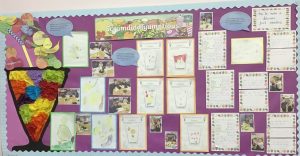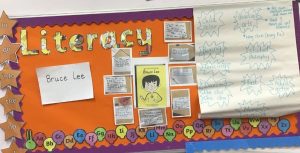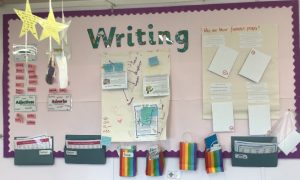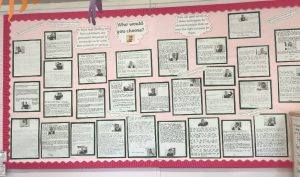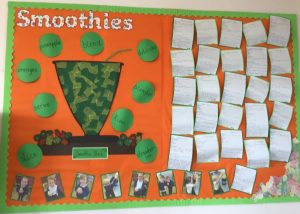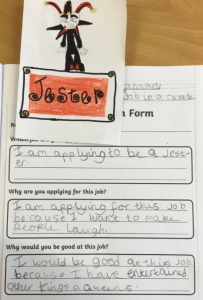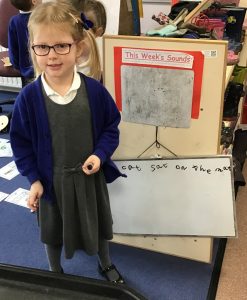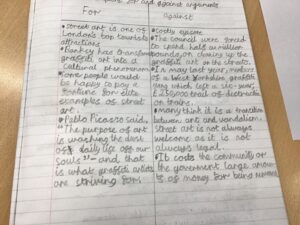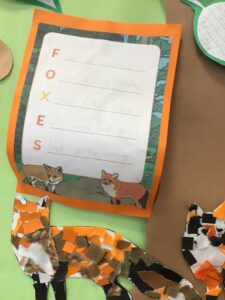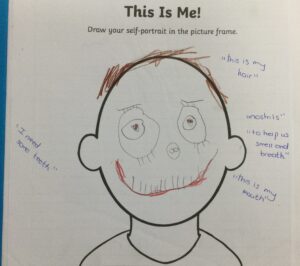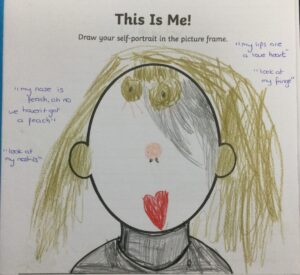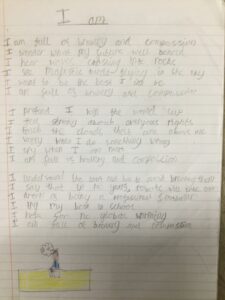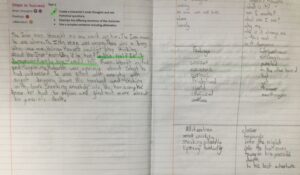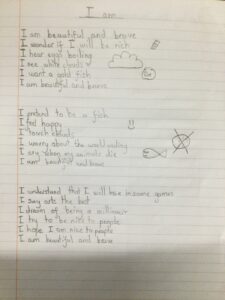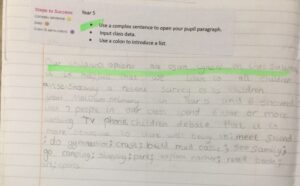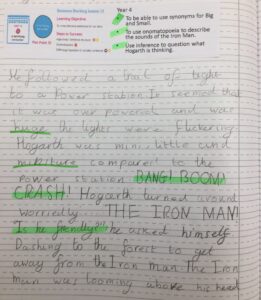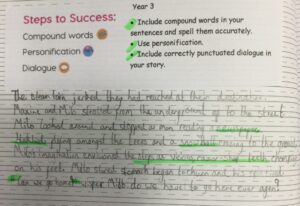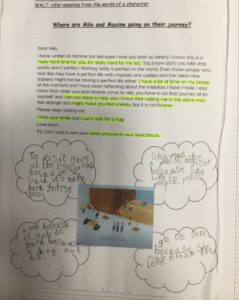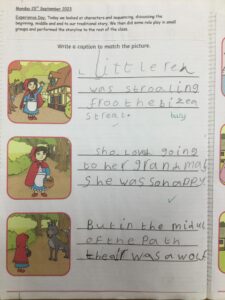English Writing
Writing Intent
At Mottram we believe that children should be immersed in high-quality literature and provided with ‘hooks’ which makes readers engage and inspire them to write. We want pupils to be able to confidently communicate their knowledge, ideas, and emotions through their writing for a variety of purposes and audiences. Vocabulary is ‘taught not caught’. Through demonstration writing, we hope that children will have a highly developed repertoire of words which they then use to extend detail and description across the text types. Our aim is for ALL learners to achieve their full potential in writing, and we are committed to providing the scaffolds and challenge needed for our children to achieve this.
Writing Implementation
Teachers plan writing based on the Talk for Writing (EYFS) and ‘The Write Stuff’ by Jane Considine (Years 1-6); these plans are linked to high-quality texts which show clear progression through the different year groups. Our lessons are enriched with buzz points in which the children are exposed to ‘real life writing’ as well as exciting reasons to write – for example special visitors, big event days or whole school theme days.
‘The Write Stuff’ approach to our teaching and learning of English is to ensure clarity to the mechanics of writing. Following a method called ‘Sentence Stacking’, the approach places emphasis on sentences being ‘stacked together’ chronologically and organised to engage children with short, intensive moments of learning that they can then immediately apply to their own writing. Within each genre studied by the children, they will learn to sentence stack, focusing on the style of the author and impact of words and sentences most appropriate for that genre.
Within each writing lesson, pupils learning is ‘chunked’ into two or three distinct parts for a writing lesson; initiate, model, enable. The initiate stage is a time to inspire using a stimulus, pupils are immersed in a rich language discussion and activities to provide a wealth of vocabulary to aid their writing. The model stage is the chunk whereby the teacher demonstrates the thoughts and processes of a writer and articulates writing choices. The enable stage is the opportunity for pupils to showcase what they can do within writing parameters known as The Three Zones of Writing: FANTASTICs, GRAMMARISTICs and the BOOMTASTICs. The Three Zones of Writing are essential components to support pupils in becoming great writers. Through the nine idea lenses known as the FANTASTICs, pupils focus on intended purpose of a sentence. The GRAMMARISTICs allow pupils to focus on the grammar element of writing which focuses on sentence structure, grammar rules and punctuation. The BOOMTASTICs allow pupils to capture and create a vivid visual for the reader using poetic devices. Throughout the writing process, children edit and redraft their work in response to feedback from their teacher and peers.
The use of a WAGOLL is used as an example of how to be successful at the start of each unit of work. This provides children with an end goal. Children are encouraged to use this as a structure but also innovate their writing to make it their own. Teachers ensure that the standard of writing in the WAGOLL reflects the age-related outcomes for each specific year group. Children are encouraged to deconstruct texts and identify key features for specific genres of writing. Teachers model the practising of these skills and children then apply them to their own writing. This ability to identify specific features we believe is a key skill across both reading and writing and will improve comprehension in children. When appropriate, the genres of writing studied run alongside the learning taking place in Guided Reading so that children are fully immersed in the text type.
We ensure that children are aware of their strengths and areas for development in writing so that learners can take ownership of their progress. Teachers leave next steps in independent write books to ensure that children know exactly what they need to do next to make progress in their writing and children are encouraged to respond to this in their next independent piece. We ensure that ALL learners are given next steps and that scaffolds and challenges are put in place for those children working below or above age-related outcomes.
Early Years Foundation Stage (EYFS)
The teachers use Development Matters to plan, leading to the achievement of The Early Learning Goals (ELGs) set out in EYFS Statutory Framework.
ELG: Writing;
– Write recognisable letters, most of which are correctly formed;
– Spell words by identifying sounds in them and representing the sounds with a letter or letters;
– Write simple phrases and sentences that can be read by others
EYFS promotes the development of writing in lots of ways including opportunities for mark making and writing that are placed all around the environment. Through pupil voice children are given the opportunity to give meaning to marks they make. Fine motor activities are always present within the environment to develop fine motor skills. Specified writing outcomes are planned and delivered using key texts for EYFS or whole school writing texts. Oracy is prioritised in our EYFS writing curriculum to build vocabulary for all learners and increase understanding of texts. Discussion, questioning and learning texts with actions (Talk for writing) all increase understanding and prepare our children with the tools they need to be successful in their writing. Pupils are encouraged to apply their phonic knowledge to write simple CVC and CCVC words which will lead into them writing simple sentences.
Key Stage 1
Building on the EYFS provision, in Key Stage 1, differentiated phonics and handwriting lessons continue, and are taught in ability groups. Pupils have regular mixed ability English lessons, using ‘The Write Stuff’ approach focusing on a particular text, or text type, with grammar integrated into these lessons. English skills are developed across the curriculum with strong links made to topics studied. Provision is made for children who require extra support through intervention programmes and differentiated class teaching.
Key Stage 2
In Key Stage 2, children have regular English lessons, using ‘The Write Stuff’ approach with integrated and discrete grammar and spelling. English skills continue to be developed across the curriculum with topic lessons used to provide cross-curricular writing opportunities. Texts are chosen, where possible, to link with the topics. Provision continues to be made for children who require extra support through intervention programmes and differentiated class teaching.
Handwriting
It is paramount that children are rigorously taught letter formation from the very beginning of their time at school. During the EYFS, the children are taught to develop the correct posture for writing, hold a pencil in the correct position and develop a legible handwriting style. Children use handwriting guides to support develop this style throughout all subjects until they have acquired the ability to join and write legibly at pace.
Spelling
From Year 2 onwards pupils follow the Jane Considine Spelling Scheme. Through exploring spelling patterns and rules and investigation of hypotheses, we aim to create confident and proficient spellers using a discrete teaching approach underpinned by phonics. When marking work, teachers identify words that children have spelt incorrectly from within that child’s known ability and the child will practice these as part of their English lesson.
Children are taught to;
- Spell accurately and identify reasons for misspellings.
- Proofread their spellings
- Recognise and use word origins, families, and roots to build their skills
- Use dictionaries and thesauruses
Grammar, Punctuation and Vocabulary
Grammar, punctuation, and vocabulary skills are taught explicitly during writing lessons and the children identify how authors have used them effectively during their reading sessions. Grammar and punctuation are planned and taught linked to the writing unit (fiction, non-fiction, or poetry) using the 2014 National Curriculum year group expectations and children are expected to apply their knowledge in their writing.
Writing Impact
Children have the knowledge and skills to be able to write successfully for a purpose and audience. With the implementation of our writing curriculum across school, children are becoming more confident writers and can plan, draft, and edit their own work. By the end of Key Stage 2 children have developed a writer’s craft, they enjoy sustained writing and can manipulate vocabulary, grammar, and punctuation to create effect. All aspects of English are an integral part of the curriculum, cross-curricular writing standards have also improved, and skills taught in English lessons are transferred into other subjects; this shows consolidation of skills and a deeper understanding of how and when to use specific vocabulary, grammar and punctuation.
The impact of our writing curriculum will be shown through formative assessment strategies, which are implemented in all lessons and summative assessments are completed on a termly basis using teacher assessment to determine whether a child is working within age-related expectations, above or below. They will base their judgements on the quality of the independent write that pupils produce at the end of each unit of work. Assessments are moderated internally as well as with our cluster schools externally. Monitoring of progress from year to year and key stage to key stage ensuring pupils remain ‘on track’ from their starting points. Termly monitoring of books show clear evidence of the use of vocabulary, spelling, grammatical understanding, punctuation understanding and text type knowledge.
Where children require additional support, interventions are put in place to target their specific need.
Pupil Voice
“I can write all my letters now. I am going to write a story one day!” EYFS
“I like to use words from the books the teachers read to me to use in my writing” Year 1
“I am learning to write like an author. Matt Hague is my favourite he uses really interesting language” Year 2
“We always have lots of interesting words to choose from on our ideas side, so I always know what to write” Year 3
“I’m never stuck when I have to write on my own because we have a chance to share and discuss ideas. I love writing!” Year 4
“We write about lots of different things in our lessons. Sometimes we use personification in a poem but now we are writing a speech to make people aware of the refugee crisis” Year 5
“I like writing about things I feel passionate about. Poetry is a good way of expressing how you feel, and I did that!” Year 6
Policy
Progression
Useful websites
https://home.oxfordowl.co.uk/kids-activities
https://www.bbc.co.uk/cbeebies/grownups/its-not-just-scribbling-its-mark-making
Mottram is inspired to write
